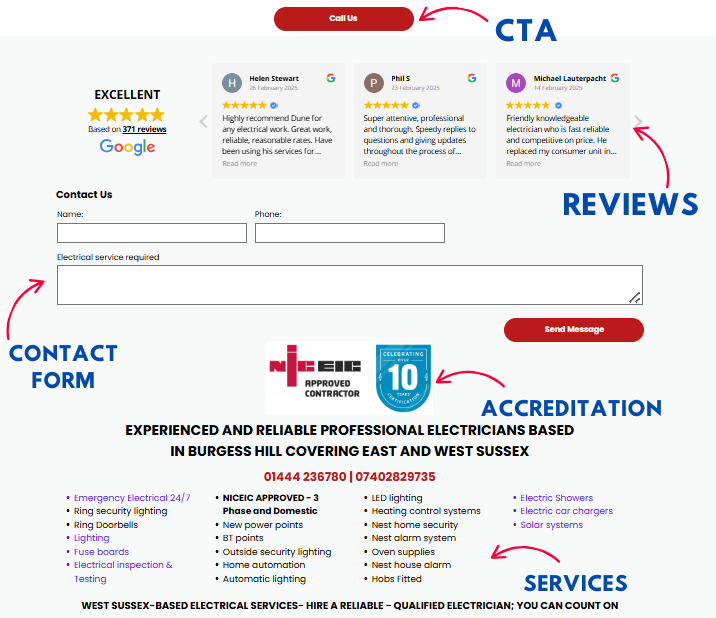The only WordPress PPC checklist that London marketers need
The only WordPress PPC checklist that London marketers need
Introduction: Your Roadmap to PPC Clarity
Imagine launching a PPC campaign in the heart of London without a checklist. It’s like setting out to explore the city without a map, GPS, or even a destination. The result? Wasted time, missed turns, and a lot of unnecessary expenses. That's what poor PPC planning looks like for WordPress site owners.
Connect SEO with dozens of London-based businesses that had great websites but lacked a structured approach to paid search. Their ads were running, budgets were burning, but conversions were flat lining. Why? Because there was no cohesive strategy tying everything together, no checklist, no plan.
This guide changes that.
In this blog, I’ll walk you through a battle-tested WordPress PPC checklist tailored for London marketers. Whether you're running a solo shop in Shore ditch or scaling an agency in Camden, this framework will help you cut waste, sharpen your focus, and finally get the return on ad spend you’ve been chasing.
Contact Us
Table of Contents
- Define Your PPC Objectives
- Keyword research with London in mind
- Audience targeting specific to London behaviours
- Create high-converting ad copy
- Landing Page Optimisation for WordPress
- Smart Budgeting and Bidding Strategies
- Track, analyse, improve
- Technical PPC hygiene for WordPress sites
- Conclusion: Your Next Step to Smarter PPC
1. Define Your PPC Objectives
Summary: Know where you're headed before you hit "Go."
One of my clients, a landscaper from Turners Hill, came to me after six months of PPC spend with no real traction. They were getting clicks but no phone calls. When I asked what success looked like to them, they shrugged. That’s when the penny dropped — they hadn’t defined their objective.
What to Include:
- Business Alignment: Ask yourself, "What is the business trying to achieve this quarter?" If it's lead generation, your PPC should aim for form fills or calls. If it’s awareness, impressions and video views matter more.
- Campaign Type Selection: Are you running search ads? Display? Remarketing? Each has different goals and metrics.
- Conversion Definition: What's a meaningful action for your business? Newsletter signup? Quote request? Online booking?
Questions to consider:
- What action do I want users to take after clicking the ad?
- Am I looking for immediate conversions or long-term awareness?
Real Example:
That legal firm realigned its strategy to focus only on phone calls. We added call extensions, optimised their Google Business Profile, and used "Call Now" CTAs. Within a month, calls increased by 40%.
2. Keyword Research with London in mind
Summary: Search terms are your compass — make sure they point to buyers, not browsers.
Have you ever watched a London cabbie work? They don’t just know the streets. They know the shortcuts, the traffic patterns, and the zones that surge at certain hours. Your keyword strategy needs that same hyper-local precision.
What to Include:
- Geo-specific modifiers: Use boroughs, landmarks, and postcodes. Example: "WordPress developer Brighton" or "PPC agency SW1."
- Tool use: Google Keyword Planner, SEMrush, Ahrefs, or Ubersuggest.
- Intent matching: Filter out generic searches like "what is PPC" unless your campaign is educational.
Questions to consider:
- Am I bidding on terms that imply action? (e.g., "hire", "quote", "book now")
- Are there terms wasting the budget with no conversions?
Real Example:
An ecommerce client selling eco-cleaning supplies added "London delivery" and "eco cleaner Brixton" to their ad groups. Clicks became more expensive, but the conversion rate doubled. Why? Because intent skyrocketed.
3. Audience Targeting: Know Your Ideal Customer
Imagine trying to sell umbrellas in the Sahara. That’s exactly what happens when you run PPC ads without proper audience targeting. Knowing your target audience is like owning a GPS for your marketing budget. You won’t waste money taking wrong turns.
What to do:
- Create buyer personas: Identify your ideal customer’s age, job, pain points, and online habits.
- Use geo-targeting: Focus your ads on London and specific boroughs if your services are hyper-local.
- Leverage remarketing: Reconnect with users who visited your site but did not convert.
Real-World Tip:
One of our clients, a boutique hair salon in Hackney, cut its ad spend by 35% and doubled its conversions after narrowing its PPC audience to a 5-mile radius.
Contact Us
4. Compelling Ad Copy and Design: Make Every Click Count
Your ad is your digital shopfront. A bland ad copy is like a dusty window — no one wants to peek inside. You need to capture attention and create a compelling reason to click.
What to include in your ads:
- Clear benefit statements: What’s in it for them?
- Powerful CTAs: “Book Your Free Strategy Call” beats a vague “Learn More."
- Ad extensions: Add site links, call buttons, and location information.
Design elements for display ads:
- Clean visuals with your brand colours.
- Headlines that solve a problem.
- Urgency elements (“Limited Offer” or “Only 3 Spots Left!”).
5. Smart Budgeting and Bidding: Spend Strategically
PPC without a smart budget is like entering a poker game without knowing the stakes. Overspending can dry up your budget quickly, but underspending may mean you never get to the table.
Budget Tips:
- Start with a test campaign: Divide 10-20% of your monthly marketing budget.
- Use automated bidding strategies: Let Google help you optimise for conversions.
- Monitor Cost-per-Click (CPC): Don’t let high-value keywords eat up all your cash.
Questions to consider:
- Am I bidding on the right keywords?
- Is my CPA sustainable for my profit margin?
6. Landing Page Optimisation for WordPress
Summary: You paid for the click — now earn the conversion.
Driving paid traffic to a poorly optimised landing page is like inviting someone to your shop and keeping the door half-closed. They will lose interest before they even step inside.
Your WordPress site needs to be built for conversion. Not just pretty — purposeful.
What to Include:
- Laser-focused messaging: One goal, one message. If your ad promises a “Free PPC Audit in London,” the landing page should deliver exactly that. No distractions.
- Mobile-first design: Over 70% of PPC traffic in London is mobile. Use responsive themes and test your page across devices.
- Lightning speed: Use lightweight themes (like Astra or GeneratePress), image compression tools (like TinyPNG), and caching plugins (like WP Rocket) to keep load times under 2 seconds.
- Visual trust builders: Logos of past clients, Google reviews, secure checkout badges — these help visitors feel confident about taking the next step.
- Easy-to-use forms: Fewer fields = more conversions. Tools like WPForms or Gravity Forms make it simple.
- CTA above the fold: Don’t make people scroll to act. Whether it’s
“Book Now”
or “Get My Free Audit,” it should be immediately visible.

7. Track, Analyse, Improve
Summary: Data doesn’t lie — but only if you listen to it.
PPC without tracking is like flying blind. You’ll burn through your budget with no idea what’s working or why. The beauty of running PPC on a WordPress site is that you have tons of tracking options — if you set them up correctly.
What to Include:
- Google Tag Manager (GTM): Install it on your WordPress site and manage all your tracking scripts in one place — from Google Ads to Facebook Pixel.
- Conversion Tracking: Set up goal tracking in Google Analytics (GA4) for key actions like form submissions, phone clicks, or online purchases.
- UTM parameters: Use them in every ad URL to understand which campaigns, keywords, and platforms drive results.
- Call tracking: Use services like CallRail or Google Forwarding Numbers to track call conversions from ads.
- A/B testing: Use tools like Google Optimize or Thrive Optimize to test landing page elements — headlines, CTAs, images — and improve incrementally.
- Regular reporting: Build weekly or monthly dashboards in Looker Studio (formerly Data Studio) to spot trends and adjust.
Questions to Consider:
- Am I measuring what matters — or just what’s easy?
- Do I have visibility into both macro and micro conversions?
- Is my data clean, accurate, and actionable?
8. Technical PPC Hygiene for WordPress Sites
Summary: A fast, functional site is non-negotiable for PPC success.
You can have the best ad copy and targeting in the world, but if your WordPress site loads slowly or breaks on mobile, you’re bleeding money. Technical hygiene isn’t sexy, but it’s the foundation for PPC efficiency.
What to Include:
- Page speed: Use tools like Google PageSpeed Insights or GTmetrix. Aim for a load time of under 3 seconds.
- Mobile optimisation: Over 60% of PPC traffic is mobile. Your landing pages must look and work well on every screen size.
- HTTPS: Make sure your site is secure — no one clicks through to an unsecured ad page.
- Plugin bloat: Too many plugins slow your site down. Stick to trusted, lightweight ones.
- Broken links: Regularly scan for 404 errors using tools like Screaming Frog or Ahrefs.
- Caching & CDN: Use caching plugins (like WP Rocket) and CDNs (like Cloudflare) to improve global load times.
- Tracking integrity: Ensure all your pixels, tags, and scripts fire properly with every campaign update.
Questions to consider:
- How long does it take for my landing page to load on 4G?
- Are any plugins interfering with my ad tracking or analytics?
- Is my site’s tech performance helping or hurting my Quality Score?
Conclusion: Turn Your WordPress Site into a PPC powerhouse
Managing PPC for a WordPress site in London isn’t just about setting up a few ads and hoping for the best. It’s about building a clear, strategic checklist that ensures every pound you spend is working hard to bring you results.
From keyword research and site integration to audience targeting and budget management, each step plays a vital role in outperforming your competitors. When you follow this checklist, you're not just running ads; you're investing in a long-term growth engine for your business.
Now it’s your move:
- Want personalised help? Book a free PPC audit with our team.












